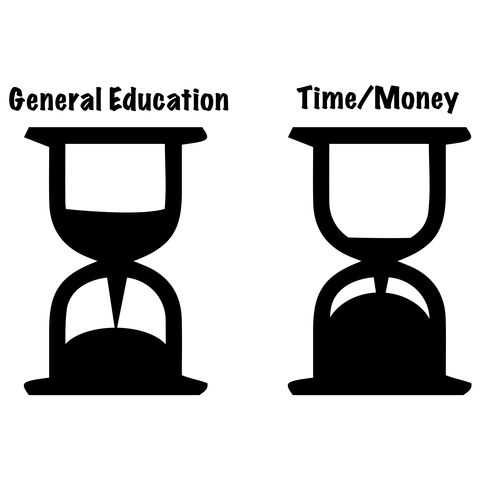Right around the time I was finishing high school, there was one piece of information about college that every adult filled me in on. Everyone claimed that a benefit about college is it’s not like high school where you have to take algebra when you would rather learn about English literature. You get to decide what classes you take, and you determine what you learn about.
Then I went to freshman orientation and had a major reality check. One of the first things they explained when we were signing up for classes was that, besides the classes we were taking for our major, there was a good amount of other classes that were completely unrelated that we had to enroll in as well.
You have to fulfill your A1 requirement and your A2 requirement and take communication classes. Then you have to take classes on science, art and humanities, social institutions, religion, sociology and political science. After that you have to move on to upper division general education.
Before you know it the system has burst your bubble and you’re back in the same position you were in high school.
The minimum amount of required units to graduate with a bachelor’s degree is 120. Forty-eight of those units must be general education courses. That means that two-fifths of the classes you need have nothing to do with your major.
As if it wasn’t exhausting enough to figure out your schedule for your major, now you have to plan around all these other classes that you couldn’t care less about. I already get wait listed for most of my classes, and now I have to worry about getting in the right section so I can take that political science course I never even wanted to take. I have enough on my plate from my major, I don’t think I could stomach a bigger work load.
The defense for general education classes is that it has great value in making a student well-rounded. Even if you want to study microbiology for the rest of your life you shouldn’t ignore U.S. history, and it would help the historian to know a little about English literature.
The problem is that no one in these classes takes any of the information seriously, including the professors. Students are more than happy not learning anything from the course as long as they get the letter grade they were expecting. Most professors that teach general education courses know that the students are only in the course because they have to be, and so the course is diluted.
If anything, these courses should be available for students to sign up for, but they shouldn’t be forced upon us. Suppose you are a physics student that has an interest in philosophy. There ought to be a beginner’s level course on philosophy that a physics student can take having no prerequisite knowledge.
The opportunity to branch out of your major should be made available, and if the course isn’t required for all students, there’s a better chance that the only people in the course are the ones who are truly interested in the subject. If the professor knows that most of the students in the course care about the material, the professor will feel more comfortable bringing a challenge to the class.
So to clarify, general education classes are not intrinsically bad. In fact, they should be encouraged for students to take. It’s making the classes mandatory that’s bad.
As a college student, I don’t want to take a class on a subject that doesn’t appeal to me. Maybe there are people who are unsure of what they want to study and taking classes on different subjects will help them figure it out, but I am not one of them.
I am a computer science major, why do I have to take a class on U.S. history?
Jeff Guzman can be reached at [email protected] or @theorion_news on Twitter.












Bruce Cawell // Mar 1, 2016 at 12:14 am
CompSci majors largely graduate without even fully understanding their own major as evidenced by those hired by a local ISP.
Probably should be taking more interpersonal communication classes than US History really.